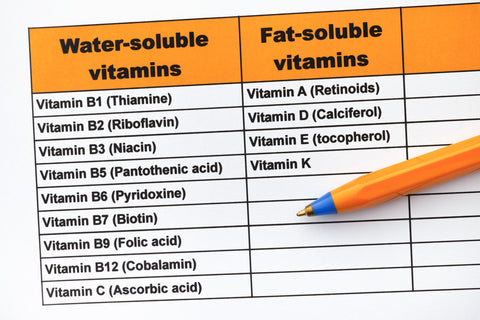Your Cart is Empty
proudly made in the United States
proudly made in the United States

Vitamins are essential nutrients that our bodies need in small amounts to carry out various functions. They are classified into two groups: fat-soluble and water-soluble. These two groups differ primarily in how they are absorbed, transported, and stored in the body.
Understanding the differences between fat-soluble and water-soluble vitamins is crucial for two reasons. First, it helps you to avoid toxic overdoses of fat-soluble vitamins, and second, you’ll maximize the benefits of your vitamin regimen when you know which foods and liquids enhance their absorption.
The primary fat-soluble vitamins are A, D, E, and K.
These vitamins need the presence of dietary fats in order to dissolve and are absorbed through the intestinal tract along with the dietary fats.
They do not dissolve in water. Without taking fat-soluble vitamins with dietary fats, you will not experience the benefits and effects of these vitamins.
Our Abundant Earth Labs Whole Food Multivitamin formula includes all of the above fat-soluble vitamins. The "Suggested Use" statement on our label states, “Take three (3) tablets together, once daily, with a meal…”.
This is not to protect against nausea; it’s to make sure your body can actually absorb the important fat-soluble vitamins in your multivitamin.
Some examples of dietary fats to take with these vitamins include: avocado, nuts, seeds, eggs, peanut butter, butter, olive oil, yogurt, full or partial fat dairy products, fatty meats, cheese, flax, tofu, and oily fish.

After absorption, the fat-soluble vitamins are then transported to the liver and other parts of the body, where they are stored in fatty tissues for later use. This fact is important.
Since they can be stored in the body, it is possible to consume too much of these fat-soluble vitamins, leading to toxicity.
Symptoms of toxicity can include dry, itchy skin, headaches, nausea, and loss of appetite. Severe overuse of these vitamins over a short period may cause symptoms such as dizziness, blurred vision, and slowed growth. In the long term, it can increase the risk of bone loss and hip fractures.
Vitamin A toxicity can also cause severe birth defects, which is why good physicians and naturopaths will ensure pregnant patients aren’t consuming excess amounts of concentrated Vitamin A supplements or liquid drops .
Your physician or functional medicine practitioner will be the best guide as you consider increasing or decreasing your intake of fat-soluble vitamins given your various needs. Additionally, a simple blood test can provide insight into your levels of vitamin depletion or excess.
We don’t love seeing supplement formulas with irresponsibly high levels of fat-soluble vitamins, and they do exist. There can certainly be reasons to be on an elevated dosage of a fat-soluble vitamin, for example Vitamin D in winter, but it should be monitored and for a specific amount of time.
Fat-soluble vitamins play an essential role in important bodily functions, such as vision, bone health, immune system functioning, and blood clotting. This is why they are important to include in a comprehensive multivitamin that uses responsible dosage strengths.
Vitamin A, for example, is essential for healthy vision, immune system function, and skin health. Vitamin D is necessary for calcium absorption and bone health, while vitamin E acts as an antioxidant and protects cells from damage. Vitamin K plays a vital role in blood clotting, and deficiencies can lead to excessive bleeding.
Water-soluble vitamins include Vitamin C, and all of the B Vitamins, which is called the “B-complex”. These vitamins dissolve in water and are not stored in the body to the same extent as fat-soluble vitamins.

They are absorbed through the intestinal tract and transported directly to the bloodstream, where they circulate freely throughout the body, delivering their benefits wherever needed.
Any excess is then excreted in the urine, and not stored in any fatty tissues. For this reason, it is highly unlikely to experience toxicity from water-soluble vitamins.
Water-soluble vitamins are some of our absolute favorites as they remarkably impact energy production, mood, metabolism, and the maintenance of healthy skin, hair, and eyes.
The B-complex vitamins include: Thiamin (B1), Riboflavin (B2), Niacin (B3), Pantothenic Acid (B5), Pyridoxine (B6), Biotin (B7), Methylfolate (B9), and perhaps our most well loved of the “B’s” - Methylcobalamin (B12) - the natural energy heavy hitter!
Abundant Earth Labs is known for the industry leading B-Complex dosage strength of our Whole Food Multivitamin formula, as many customers have experienced a remarkable increase in energy and mood. We maintain our high dosage strengths, knowing that it’s safe to do so.
We include 500 mcgs of Vitamin B12 in order for our energy support to actually be effective. We know it can look high, but the IOM (Institute of Medicine) has yet to set an upper limit for the amount of Vitamin B12 in supplement use because it’s water-soluble and has such a low potential for toxicity.
Vitamin C is an antioxidant that protects cells from damage, helps wounds heal, and is necessary for collagen production, which is vital for healthy skin, teeth, and bones.
We use a marvelous Amla Fruit Extract as the source of Vitamin C within our multivitamins and it works beautifully to maintain healthy vitamin C in the blood.
Understanding the difference between fat-soluble and water-soluble vitamins is essential for maintaining good health and safe supplement usage.
Fat-soluble vitamins are stored in the body, while water-soluble vitamins are not.

Both types of vitamins play critical roles in the body, and deficiencies or excesses can lead to health problems. Therefore, it is important to ensure that you are consuming a balanced and varied diet that includes foods that are rich in both fat-soluble and water-soluble vitamins.It’s also essential that you take supplements that have been safely and clinically formulated, like our Whole Food Multivitamin, in order to protect your long term health - especially if it’s a supplement that you use daily.